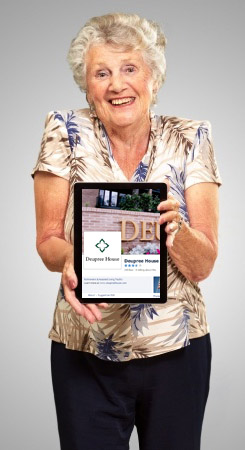
More and more seniors are staying connected to the world around them via the Internet. The digital generational divide is shrinking: older people are finding social media and e-mail a convenient and quick way to keep in touch with loved ones, family and friends. In fact, a 2012 study conducted by the non-profit Pew Research Center found that, for the first time, more than half of Americans over the age of 65 were using the Internet or e-mail with regularity.
Given the rapid pace of technological development, it can be difficult for people in their later years to keep up with changes.
To help their resident get comfortable with new technologies, some retirement communities, like Deupree House in Hyde Park, now include digital education as part of their social enrichment programs.
Learning to Use iPhones and Other Technology
Many older people are comfortable using basic cellular phones, but the increasing prevalence of smartphones means that seniors must now learn new technologies if they want to stay connected.
Due to the relative complexity of many smart phone functions, it can take a considerable amount of time for a person unfamiliar with the technology to learn its operation.
Classes that cover the new technology, like our “Learning iPods, iPads, and iPhones with Dr. Giesel,” are most effective when structured like an ongoing college course. The Deupree House class meets four hours per week two hours on Tuesday afternoon and two hours on Saturday—and pairs five new iPhone users with five people who are already familiar with iPhone functions.
During the first hour of every meeting, class participants review old material, and new material is slowly introduced in the second hour—allowing residents to learn new technology skills while strengthening neighborly bonds and enriching each other's lives.
Computer Assistance
Another successful program at the Deupree House has been Computer Assistance. Every Friday night, residents are able to get instruction in a number of areas:
- Software operation for commonly-used programs like Word, Excel, and PowerPoint.
- Internet browsers and web surfing
- Social media account set-up and usage
- File management techniques that make storing and accessing personal data easier and more secure
Our computer assistance program is so popular with Deupree House residents that sign-ups for weekly sessions are held in advance, as the limited weekly space fills up quickly.
Seniors and Social Media
Many older Americans have turned to social media sites to maintain communication with family and friends.
According to the AARP, a third of all seniors now use social sites like Facebook, Twitter, or Skype to stay in touch with loved ones. Physical separations and distances that used to isolate seniors are now becoming irrelevant through digital networking. Grandparents can visit online with grandchildren over video links, family members can share pictures and one can even look up former colleagues long since out of touch.
Be Aware of Potential Dangers
With increasing social media and internet usage, though, come some hazards. Seniors are a high-risk group for being targeted by cyber-criminals seeking to exploit their relative unfamiliarity with technology.
Seniors are frequently approached via e-mail by con artists representing themselves as government officials, law enforcement officers, creditors, or companies. They may request a person send personal information to clear up supposed debts or legal infractions, or to receive inheritances, rewards, or free trial products and services. But a legitimate business would never ask for any banking or personal identifying information (social security number, birthdate, address, or account passwords) to anyone requesting such information by e-mail or social media posting.
Often, scammers are quite clever and will use official corporate logos—sometimes stolen from legitimate organizations—to make it look like a reputable party is contacting you. If you don't recognize a sender's e-mail address or personally know a poster to your Facebook wall, err on the side of caution.
Some internet users can fall victim to malware embedded in websites—programs that infect computers and steal personal information, monitor web activities, or even destroy data. But investing in a good virus protection, and avoiding dubious advertisements and pop-ups when visiting websites can help keep you safe.











